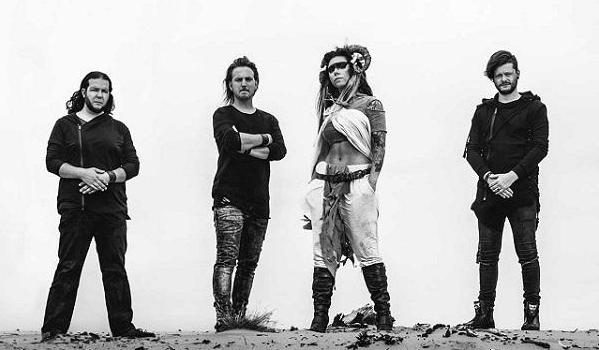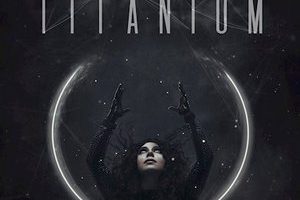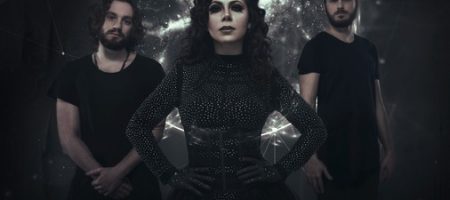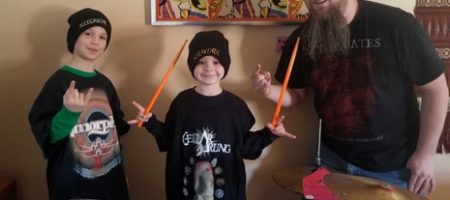Phantom Elite – Enter the Wasteland
Sunday, 11th March 2018
In a world that has become quite concerned with instant gratification and the need for things on-demand in real time, Phantom Elite has taken a contrasting and honorable approach. They’ve methodically arranged their music into position with time and care. From the beginnings of it all, with a video release of “Siren’s Call” back in 2016, we are now just at the point where their debut album, Wasteland, will see the light of day.
This patient and calculating approach has paid off, as Wasteland stands tall above its symphonic metal peers. To the point where it seems a disservice to label the act as merely a symphonic one. Some nods to the familiar to be sure, but there’s an added heft and sonic weight to the material, and even some theatrical nods to enjoy. It all swirls together to create something that is intricate yet accessible, and never goes directly into the more pop-driven landscape that many of their peers do.
DR caught up to vocalist Marina La Torraca and drummer Eelco van der Meer to talk about the band’s route towards the album release. What comes across is that Phantom Elite is in it for the long run – they have a plan and a strategy to succeed, and are willing to put in the extensive time and effort to do so. Since this interview was conducted, the band has made their official album announcement and release date through Painted Bass Records, and pre-orders are available HERE or HERE. Fans in Brazil may order HERE.
Dead Rhetoric: It’s been a while in getting Wasteland out there. In the age where most bands record a demo in their basement and fire it off directly onto the Internet, do you feel it was advantageous to wait until you had everything ready to go?
Marina La Torraca: I think nowadays, recording a cheap demo won’t cut it. Everyone is used to such a high-quality, pristine sound. No one will even listen to a shitty demo – not labels, not any partnerships.
Eelco van der Meer: I do think demos have gotten 10,000% better now than when you compare them to 10-15 years ago. But I also think that a lot of bands put out their first work way too early. Especially here in the Netherlands, there’s quite a few bands that could be good but they are putting it out too soon, just to be able to perform.
La Torraca: I would say that’s a strategy, or a choice maybe, like “Let’s put it out there and learn from it” and then do a better one. We were very careful with everything. The recording itself – it took a long time. We were going back and forth and it took us ages.
van der Meer: We could have waited longer, but we had this tour last December [with Angel Nation], so we had to get it out there and do some shows. The album is still not even officially out, but I’m glad we had it on the tour. For us, in the end, we wanted to explore our sound a bit and work on some songs that didn’t make it. A lot of people wrote stuff for the album so we tried out a lot of things, which also helped the group. It wasn’t easy, and at times it was frustrating for us, but in the end it made us a better group of people.
Dead Rhetoric: So you unofficially released the album so you could have it out on tour, are you going to be pushing it harder as the ‘official’ release date gets closer?
La Torraca: Yeah, the idea is to push this album as far as we can, and then start the next one already [laughs].
van der Meer: I think that it’s important that it gets pushed more than it is now [January] – worldwide coverage, reviews, interviews, stuff like that. But at the same time, the first album doesn’t have to get us to the roof. The first floor is fine – we should get a lot farther with the second album. It’s a long term thing.
Dead Rhetoric: It’s interesting to hear your approach, again going back to many newer bands that have this immediate ‘want to get it out there and get huge’ mentality. It’s refreshing to see that you want to take it slow and do what you need to do in order to make your music flourish and be successful.
van der Meer: Yeah – I have to credit Sander [Gommans] for that as well to be honest. He knows his way around the music business and he toured a lot with After Forever. There have been some moments where he said, “It’s okay. Don’t rush it. Follow the path/strategy.” The bands that I personally love – bands like Opeth, Gojira, and Dream Theater – go back and listen to their first albums now. They have evolved over 15-20-25 years to become as good as they are now, and I love that approach.
Dead Rhetoric: What do you feel separates Phantom Elite from other symphonic metal acts?
La Torraca: I think it’s that we never really aimed to fit a specific niche. It was never like, “Ok, let’s be a me-too band.” I’m not really glorifying that, but it just sort of happened that every member of the band is not interested in copying Nightwish, or someone similar. With this project, I have other projects and other stuff going on professionally, the intention is totally different. For me, it’s really important to have my expression and the other band members want to have their expressions there – we want to try out stuff.
We aren’t afraid of, “Oh, that’s not going to sell” or something like ‘people expecting choirs at certain spots.’ We didn’t really go for that. When I was writing the vocal melodies, I was thinking about making a catchy chorus, because good songwriting is good songwriting. It doesn’t need to be all over the place. It needs to make sense overall, but the difference is that we don’t aim for a certain repeating image or sound. We aren’t interested in that.
van der Meer: There’s really only one choir part in the whole album [“Every Man for Himself’], right? Did you think about anything when you were writing that?
La Torraca: No, Sander and I came up with that – we thought it would be really evil if we had a choir right there. We thought of it as being a bit Satanic and funny, so we put it in [laughs].
van der Meer: It’s true though – the first 4-5 songs we wrote – most of the things we talked about was if it was a good song, and if it wasn’t, we worked even harder to make sure it was. Secondly, we asked if it was fresh. Was it modern? Was it away from the standard stuff that’s in this genre? That was not a goal in itself, but as soon as we started writing, we thought okay, let’s keep it a little different.
Dead Rhetoric: I like the contrast that exists in the music – nothing’s forced. You can have a soft ballad like “Astray” and a bigger and epic track like “Revelation” right next to each other. I think those dynamics give you a bit more personality.
van der Meer: It’s funny that you mention that song [“Revelation”], because that song was already on the HDK album from Sander. We basically just rearranged that one a little bit.
La Torraca: We started the band as an HDK live band, which is how Sander got involved. We were only going to play HDK stuff live, for a short period of time. We started to write right away, but we kept the influence. “Revelation” fits in the album, it doesn’t feel like a weird cover.
van der Meer: It fits right in to the live set as well. I have credit Sander for that as well. A lot of the basic song riffs and choruses on the album come from Sander. He has a real talent for just whipping them out without difficulty. They have something fresh and modern, and we as a band take it and evolve it into a Phantom Elite song.
Dead Rhetoric: So as you move forward, will Sander be as involved in the new material as he was for Wasteland?
van der Meer: He’s going to be involved…it depends. Around the time that we decided to move on from being an HDK live band and become Phantom Elite, I think a few weeks after that, Sander sent us an email and was like, “Hey guys, here’s the first four songs. Enjoy!”
La Torraca: He is extremely fast with writing the basic song structures. So we were like, “This is great. Why not work with it?” So if it happens again, that’s what going to happen [laughs].
van der Meer: But at this point, we are forming the first ideas and concepts that may be the basics for album number two. The band members – me, Ted [Wouters], and Goof [Veelen] – are going to play a larger part in writing the basic stuff as well as arranging it. So Sander may be involved, but it will be a little bit of a different role.
Dead Rhetoric: You recently started playing live last fall – do you feel you’ve worked out the initial kinks in the band’s performance?
van der Meer: Oh god, no [laughs].
La Torraca: We have already grown a lot. It’s strange because we started out as a studio band for so long. We all had bands before. I’ve been singing in bands since I was 15. This is actually the first one that didn’t start by playing out there. It was very different for us to build everything and then have to do it live [laughs]. We adapted many songs, and we are trying to bring something a bit different from the other bands in the genre.
We want to present a ‘live’ feel. We are rearranging some things, we are leaving some samples out, and working with the minimum number of backing tracks possible because we want to keep the ‘rock’ feeling of being a live band. We have been working on that and trying to perfect it – the live arrangements, the backing tracks, and of course our performance as a band on stage. We have learned a lot from this little tour.
van der Meer: We grew a lot over 10 shows. I think it’s really good that those 10 shows happened in two weeks rather than being spread over a couple months. It gave us the opportunity to spend all that time together. But at the same time, we are going to go back to playing live in March and do quite a few gigs over a few months. Unfortunately we will not have a live keyboard player, and we will have a different bass player. So we aren’t starting at zero, but it will take a little time to get used to everything. But I think we will grow more, I think we’ll get better over the course of those few months.
La Torraca: Hopefully that’s what happens [laughs]!
Dead Rhetoric: For what it’s worth, I was checking out some of the videos from the Female Metal Fest and then the tour with Angel Nation, and it seemed exciting enough to me.
van der Meer: We were excited about doing those shows. I think that was one of the things that was really great about those shows – we discovered that we all felt really happy with being on stage and rocking out. On the technical stuff, there’s always room to improve, but for the audience, I think that energy is the most important thing anyway.
Dead Rhetoric: I probably should have opened with this one but what’s behind the name, Phantom Elite?
La Torraca: Actually, since we started as an HDK project, we thought it would be a nice idea to connect the name to that. Phantom Elite is part of the lyrics to the song “Eternal Journey” from the album Serenades of the Netherworld. Sander came up with the name actually. He was like, “If no one has a better name, we’ll use this one.” It actually sounds good and it makes sense. It’s not a 3-word name band. I don’t want to offend 3-word named bands but… [frustrated scream]
van der Meer: [Laughs] But also, it doesn’t point towards anything classical like Within Temptation or After Forever. It sounds modern.
Dead Rhetoric: Could you talk about the visual aspects and maintaining creative control over much of the process – does it give the band more genuine feel?
La Torraca: That was basically my idea since we started the album. I got the concept of Wasteland and I in no way wanted it to be the ‘goth guys with eyeliner and me wearing a corset’ approach. It wasn’t going to happen. So I thought that it would be a way to bring a strong theatrical image to the band. It’s in my background, and I personally appreciate when bands do that, but it also works for the audience. It’s easy to see what the band is about, from the logo to what the band is wearing onstage, it tells a lot about our sound as well.
van der Meer: It’s your [Marina’s] concept; it’s not something from outside the band. Its part of us being an independent band doing our own thing.
La Torraca: The design stuff is done by me, and the album artwork was also done by me.
van der Meer: Also all the stuff you see on Facebook and things like that were done by Marina.
Dead Rhetoric: To that end, have you found social media a successful avenue to promote the band? Personally speaking, I don’t know if I would have found the band if it wasn’t for the messages you sent on Instagram a few years ago.
La Torraca: Eelco is the big social media guy for the band. I think it helps. The industry and everything is changing. Bands have way more power in their hands. The industry may be the door keeper, but bands have more power in their ability to share their music and information with the world.
van der Meer: It started from sheer enthusiasm that we were announcing the band in the summer of 2016. I knew we had “Siren’s Call” coming up as the first single, and you [Marina] were doing some shows with Avantasia. I just thought that if someone wasn’t going to send messages out to people that we are here, then how are they going to know? So that’s basically what I did. I sent thousands of people messages, just like you, and most of our followers, at least on Instagram, came from there. Just from people clicking on the link and starting to follow us. You have that power as a band if you are willing to invest that. There’s no bot likes, no paid campaigns, it’s all just us.
Dead Rhetoric: Marina, I know you were just on the theater stage as well. How would you describe the difference in performing in a musical versus a heavy metal show?
La Torraca: It’s very different. With theater, the first and biggest difference is that you do not interact with the audience, unless you are breaking the fourth wall in some contemporary piece [laughs]. The point is to act as if there is no one watching. With a band, you have to engage with the audience. They are there for them; of course you are also there for them in theater as well, but it’s a different place to work from.
Another thing is that in theater I am always playing a role. It’s not “me” on stage. If I am, there’s something really wrong with my performance [laughs]. So I try to not be me. With Phantom Elite, there’s a little bit of this persona going on, but I think we are quite authentic. I’m very much myself. We are known for making stupid jokes on stage and not taking ourselves too seriously. So we aren’t that theatrical in that aspect. We are just high on adrenaline [laughs]. When I’m working in the theater production, it’s never my call – which is, in a way, less stressful. But with Phantom Elite there is the reward that everything we do is our call. Also, the recognition that we get is from our work alone, which is pretty cool.
Pages: 1 2




























